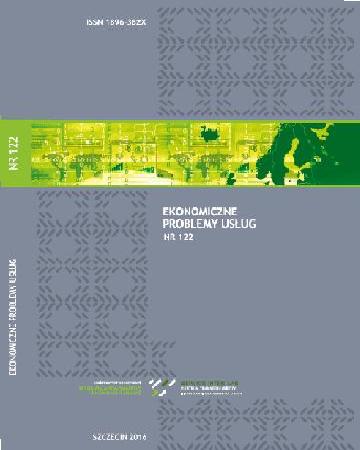
ISSN: 1896-382X
eISSN: 2353-2866
OAI
DOI: 10.18276/epu.2018.130-10



Issue archive /
nr 130 2018
Relacje rynku turystycznego z rynkami substytucyjnymi
(TOURIST MARKET RELATIONS WITH SUBSTITUTION MARKETS)
| Authors: |
Aleksander
Panasiuk
Uniwersytet Jagielloński Wydział Zarządzania i Komunikacji Społecznej |
| Keywords: | tourism market tourist services market leisure market substitution. |
| Data publikacji całości: | 2018-03-30 |
| Page range: | 10 (99-108) |
| Klasyfikacja JEL: | D47 L82 L83 L86 Z31 Z32 |
Abstract
The article presents the issues of substitutability of the tourism market with industry markets. The basic scope of substitution covers the tourism market with other leisure markets. At the outset, the issues of: the functioning and structure of the tourism market were presented. Next, the essence of substitutability of the tourist market was interpreted and the scope of its substitution with leisure markets was indicated and the characteristics of selected substitution markets were made. Other areas of substitutability in relation to the tourist market were also indicated. The basic effect of the analyzes carried out is the determination of three types of relationship between tourism market substitution and leisure markets. The aim of the study is to present the issue of substitution of the tourism market with other industry market, along with specifying the type of relations that take place between them.
Download file
Article file
Bibliography
| 1. | Bombol, M., Dąbrowska, A. (2003). Czas wolny. Konsument, rynek, marketing. Warszawa: Liber. |
| 2. | Cieloch, C., Kuczyński, J., Rogoziński, K. (1992). Czas wolny czasem konsumpcji. Warszawa: PWE. |
| 3. | Ďuriček, M., Obodyński, K. (2006). Syntetyczne podstawy rekreacji i turystyki. Rzeszów: Wyd. UR. |
| 4. | Düssel, M. (2009). Marketing w praktyce. Warszawa: BC.edu. |
| 5. | Jung, B. (1996). Leisure Statistics Turing the Period of Reforms in Poland. W: J. Cushman, A.J. Veal, J. Zuzanek (red.), World Leisure Participation (s. 262–276). Oxford: CAB International. |
| 6. | Kleiber, D. (1999). Leisure Experience and Human Development. A Dialectical Interpretations. New York: Basic Books. |
| 7. | Kurek, W. (red.) (2007). Turystyka. Warszawa: Wyd. Naukowe PWN. |
| 8. | Kwilecka, M. (red.) (2006). Bezpośrednie funkcje rekreacji. Warszawa: AlmAmer. |
| 9. | Marciszewska, B. (2010). Produkt turystyczny a ekonomia doświadczeń. Warszawa: C.H. Beck. |
| 10. | Panasiuk, A. (2014). Rynek turystyczny. Studium strukturalne. Warszawa: Difin. |
| 11. | Panasiuk, A. (red.) (2008). Gospodarka turystyczna. Warszawa: Wyd. Naukowe PWN. |
| 12. | Panasiuk, A. (red.) (2011). Ekonomika turystyki i rekreacji. Warszawa: Wyd. Naukowe PWN. |
| 13. | Panasiuk, A., Michalska, K., Wolska, A. (2016). Polityka turystyczna krajów Unii Europejskiej w zakresie oddziaływania na nierówności społeczne. Zeszyty Naukowe Polskiego Towarzystwa Ekonomicznego, 4, 177–190. |
| 14. | Pawlicz, A. (2012). E-turystyka. Warszawa: Wyd. Naukowe PWN. |
| 15. | Rucińska, D. (2011). Badania rynku usług lotniczych. Istota, zakres, użyteczność, przykłady. Zeszyty Naukowe Polskiego Towarzystwa Ekonomicznego, 9, 287–304. |
| 16. | Salmann, N. (2010). Magatrend wellness & spa dla rynku usług wolnego czasu i hotelarstwa XXI wieku. Kraków: Linea. |
| 17. | Siwiński, W. (2007). Współczesne problemy turystyki i rekreacji w badaniach emirycznych nauk społecznych. Warszawa: AlmaMer. |
| 18. | Szymańska, E., Dziedzic, E., Panasiuk, A., Panfiluk, E., Rutkowski, A. (2017). Innowacje w turystyce zdrowotnej. Warszawa: Difin. |
| 19. | Toczek-Werner, S. (red.) (1999). Podstawy rekreacji i turystyki. Wrocław: Wyd. AWF. |
| 20. | Urry, J. (2009). Socjologia mobilności. Warszawa: Wyd. Naukowe PWN. |
| 21. | Wolańska, T. (1997). Leksykon. Sport dla wszystkich – rekreacja ruchowa. Warszawa: Wyd. AWF. |